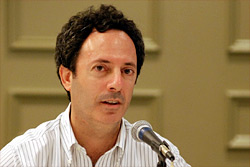Berkowitz: Yale Sexism Lawsuit Has High Costs
 Peter Berkowitz writes in the Wall Street Journal:
Peter Berkowitz writes in the Wall Street Journal:
Last month, 16 Yale students and recent graduates filed a confidential complaint with the Department of Education's Office for Civil Rights alleging that in violation of Title IX—which bans sex discrimination in schools—Yale maintains a hostile environment for women that denies them equal access to educational opportunities. The Office for Civil Rights has already begun to investigate. If it finds Yale in violation, the university could lose approximately $500 million in federal funding.
Is the complaint really plausible?
In the classroom, on the athletic fields and elsewhere throughout campus life, women at Yale are prospering. In 2010, female undergraduates outnumbered male undergraduates 2,663 (50.5%) to 2,616 (49.5%). Yale aggressively recruits, promotes and retains female faculty. Four of the university's top eight administration officers are women. The dean of Yale College is a woman. So is the dean for special projects.
More broadly, women's gains in higher education over the past 50 years testify to the friendliness of the environment. In 1960, women earned 10% of doctorates nationwide; by 2009, they earned 52%. In 1960, women earned 35% of bachelor's degrees and 32% of master's degrees; today they earn 57% and 60%, respectively. In 1960, total fall enrollment in degree-granting U.S. institutions was 36% female; today it is roughly 57%.
So what are the aggrieved Yale students saying? In a statement to Bloomberg News on April 1, complainant Hannah Zeavin, class of 2012, mentioned instances of alleged sexual harassment, including a march through the freshman quad on Oct. 13, 2010, in which Delta Kappa Epsilon fraternity members and pledges chanted "No means yes. Yes means anal." Ms. Zeavin also referred to an incident two years before in which fraternity pledges stood in front of the Women's Center holding posters stating, "We love Yale sluts."
Such behavior is loutish, but it does not nearly meet the legal definition of sexual harassment. In Davis v. Monroe County Board of Education (1999), the Supreme Court held that to qualify as sexual harassment that creates a hostile environment, conduct must be "so severe, pervasive, and objectively offensive that it can be said to deprive the victims of access to the educational opportunities or benefits." Isolated incidents of speech—however mocking, nasty or ugly—that do not involve direct threats of physical injury or extortion do not constitute sexual harassment.
Moreover, Yale has hardly taken a passive stance toward offensive speech. According to the Yale Daily News, on Oct. 14, 2010, four DKE fraternity brothers met with and apologized to five Yale Women's Center board members for the fraternity's public vulgarities the night before. Representing the university administration at the meeting was Melanie Boyd, director of undergraduate studies in the Women's, Gender, and Sexuality Studies program and special adviser to the dean of Yale College and the student-run Women's Center.
The same day, the president of DKE wrote to the Daily News declaring the chants "inappropriate, disrespectful, and very hurtful to others." And on Oct. 15, Dean Miller delivered opening remarks at a "Forum on Yale's Sexual Climate" that featured Yale administrators and Women's Center board members discussing how to prevent such incidents.
It is hard to see what more a college devoted to liberal education could do. The U.S. Supreme Court's First Amendment jurisprudence reaffirms John Milton and John Stuart Mill's hard lesson that one cost of liberty is the toleration of foolish and odious speech. That Yale finds itself under pressure from the government, in the face of stupid frat-boy initiation rituals obviously designed to humiliate the pledges themselves, dramatizes how far government and higher education have drifted from the principles of freedom.
Click here to read more.

